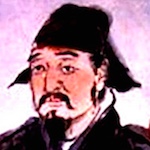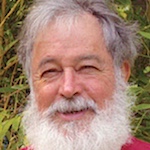

Tao Te Ching

Wang Bi 王弼
226 – 534 CE
Although he only lived 23 years, for more than 1,700 years most Chinese scholars have considered Wang Bi the most important interpreter of the Tao Te Ching and his edition of this has been used for almost every translation into a Western language. A political theorist who challenged the prevailing Confucian orthodoxy, he interpreted Lao Tzu in a way consistent with Confucius and compatible with both indigenous Chinese beliefs and the introduction of Indian Buddhism. Interesting and inspiring how one so young can understand so deeply and influence the course of history so much.
Lineages
Taoist Translators
Eras
Chinese
Three Kingdoms 三國時代 (220 – 280 CE)Jin Dynasty 晉朝 (265 – 420 CE)
Southern and Northern 南北朝 (420 – 589 CE)
Unlisted Sources
Quotes by Wang Bi (24 quotes)
“By means of tranquility, the murky becomes clear. By means of movement, the still becomes alive. This is the natural Way.”
Chapters:
15. Inscrutability
Comments: Click to comment
“Although we live today, we can understand the distant past. We can understand without going outside. If we don’t understand, going farther only leads us farther astray.”
Chapters:
15. Inscrutability
Comments: Click to comment
“As with a tree, the more of it there is, the farther it is from its roots. The less of it there is, the closer it is to its roots. ‘More’ means more distanat from what is real. ‘Less’ means closer.”
Chapters:
22. Heaven's Door
Comments: Click to comment
“Everything in the world comes from being, and being comes from nonbeing If you would reach perfect being, you have to go back to nonbeing.”
Chapters:
40. Returning
Comments: Click to comment
“If we don’t obstruct their source, things come into existence on their own.”
Chapters:
10. The Power of Goodness
Comments: Click to comment
“One is the beginning of numbers and the end of things. All things become complete when they become one. But… by focusing on being complete, they lose their mother… they crack, they crumble… their mother has no form.”
Chapters:
39. Oneness
Comments: Click to comment
“Only when we take emptiness as our virtue can our actions accord with the Tao.”
Chapters:
21. Following Empty Heart
11. Appreciating Emptiness
Comments: Click to comment
“Prohibitions are intended to put an end to poverty, and yet the people become poorer. Tools are intended to strengthen the country, and yet the country becomes weaker and more chaotic. This is due to cultivating the branches instead of the roots.”
Chapters:
57. Wu Wei
Comments: Click to comment
“Seeing what is great is not vision. Seeing what is small is vision. Protecting the strong is not strength. Protecting the weak is strength.”
Chapters:
52. Cultivating the Changeless
Comments: Click to comment
“The mind of sages has no point of view, and their thoughts have no direction.”
Chapters:
49. No Set Mind
Comments: Click to comment
“The Tao drifts everywhere. It can go left or right. It can go up or down. Wherever we turn, it’s there for us to use.”
Chapters:
34. An Unmoored Boat
Comments: Click to comment
“The Way is what things follow. Virtue is what they attain. ‘Dark Virtue’ means virtue is present but no one knows who controls it.”
Chapters:
51. Mysterious Goodness
Comments: Click to comment
“The world turns to the great state that cultivates humility. Thus, each gets what it wants. But it is the great state that needs to be more humble.”
Chapters:
61. Lying Low
Comments: Click to comment
“These five tell us to refrain from acting and to govern things by relying on their nature rather than on their form.”
Chapters:
27. No Trace
Comments: Click to comment
“Those who are remorseful sympathize with their opponents. They try not to gain an advantage but to avoid injury. Hence, they always win.”
Chapters:
69. No Enemy
Comments: Click to comment
“Those who live for themselves fight with others. Those who don’t live for themselves are the refuge of others.”
Chapters:
7. Lose Yourself, Gain Your Soul
Comments: Click to comment
“Those who seek the Tao seek to return to emptiness and nothingness. When something is done, something is left out. When nothing is done, nothing is not done.”
Chapters:
48. Unlearning
4. The Father of All Things
Comments: Click to comment
“To discover the Tao, nothing is better than embracing simplicity.”
Chapters:
32. Uncontrived Awareness
Comments: Click to comment
“To wear coarse cloth is to become one with what is ordinary. To keep one’s jade concealed is to treasure the truth. Sages are difficult to know because they do not differ from ordinary people and because they do not reveal their treasure of jade.”
Chapters:
70. Inscrutable
Comments: Click to comment
“we call it ‘the formless form.’ But although it has neither shape nor form, neither sound nor echo, there is nothing it cannot penetrate and nowere it cannot go.”
Chapters:
14. Finding and Following the Formless Form
Comments: Click to comment
“When the Tao is present, contentment reigns. People don’t seek external things but cultivate themselves instead.”
Chapters:
46. Enough
Comments: Click to comment
“The nature of the myriad things is spontaneity. It should be followed but not interfered with.”
Chapters:
29. Not Doing
Comments: Click to comment
“From the infinitesimal all things develop. From nothing all things are born.”
Comments: Click to comment
“When we are free of desire, we see where things begin. When we are subject to desire, we see where things end.”
Comments: Click to comment
Quotes about Wang Bi (1 quotes)

“Famous for the quickness of his mind as well as the breadth of his learning, [Wang Bi] grew up with one of the best private libraries of his time. Although he died of a sudden illness at the age of 24 he was among the first to discuss Taoism as metaphysics rather than religion. As a result, his commentary has been preferred over that of Heshang Gung by Confucian scholars.”
Comments: Click to comment
Comments (0)